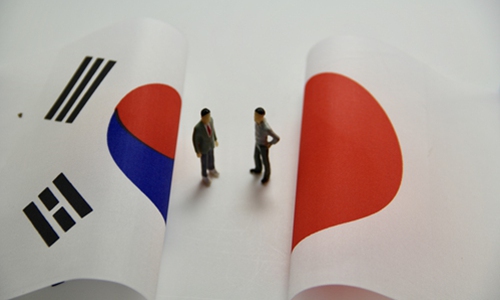HOME >> OPINION
South Korean media must restrain their sensitive nerves
Source:Global Times Published: 2019/12/27 19:14:58

Photo: IC
In the past few days, South Korean conservative media have launched a spree of hyped reportage on China-South Korea relations. South Korean President Moon Jae-in was in China recently to attend the China-Japan-South Korea trilateral summit, during which he met with the Chinese President Xi Jinping in a bilateral meeting on December 23. However, it was discerned that the media adopted a different tone while covering Moon's remarks. While Chinese media reported Moon stating both Hong Kong and Xinjiang affairs as China's internal affairs, South Korean media denied Moon saying anything as such. Rather, the reports attributed Moon as merely expressing he understood the statement from the Chinese side.
When it comes to meetings between heads of nations, it is quite usual for the two sides to have different perspectives. Japanese Prime Minister Shinzo Abe's wordings during his meeting with President Xi were also reported differently as both countries have different standpoints on similar issues. But that didn't spark controversy on either side.
Since the US initiated the trade war against China, the two sides have often expressed their different views on negotiations or dialogues. On most occasions, divergences exist in their respective reports, and both parties have made follow-up clarifications. But both sides have been sticking to the facts.
Startlingly, some South Korean conservative media outlets not only claimed that the Chinese media reported things wrongly and accused China of being diplomatically irrational, they also termed China as a "fake friend." Some even went on to call Moon's China trip as a reflection of South Korea's Sadaejuui, which in literal terms means serving the great.
The Chinese society generally respects South Korea and highly recognizes its achievements in economic and social development. South Korean culture has a broad influence on the Chinese society, which is viewed positively by most Chinese. The Chinese public neither has any collective sentiment of belittling nor a sense of contempt toward South Korea. Besides, the Chinese media do not have any such value orientation. The hope that Beijing and Seoul can develop a friendly relationship is undoubtedly the mainstream attitude in China.
That's why it is a pity to see some South Korean media showing such intense emotion because of different reports picking up a sentence from Moon's remarks. It is hoped this is only those media's habitual hype and does not mean anything significant.
Perhaps some people from South Korean media are paying particular attention to aligning themselves with Western values, and when there is a value friction between China and the West, siding with the West may help them maintain pride in the face of an increasingly stronger China. In addition, they have a special obsession with China-bashing. But this is certainly not a good way for self-motivation.
South Korean media accuse China of being a fake friend, but then which country is South Korea's real friend? Is it the US, which asked South Korea to pay five times more for US troops' deployment? Is it Japan, which cut off the supply of key materials vital to South Korea's tech industry? When it comes to issues such as the Korean Peninsula denuclearization and long-lasting peace, which country's interests are closely connected with that of South Korea?
China is South Korea's biggest trading partner. If China is South Korea's fake friend, how many real friends does South Korea have in the world?
The nationalist attitude of some in South Korean media is the most severe in the entire region. Their actions won't help them earn the South Korean society any extra respect. It is hoped they can restrain their sensitive nerves and show at least a sense of responsibility for maintaining China-South Korea friendly relations. This is the proper conscience and rationality they are supposed to adhere to.
RELATED ARTICLES:
Posted in: EDITORIAL